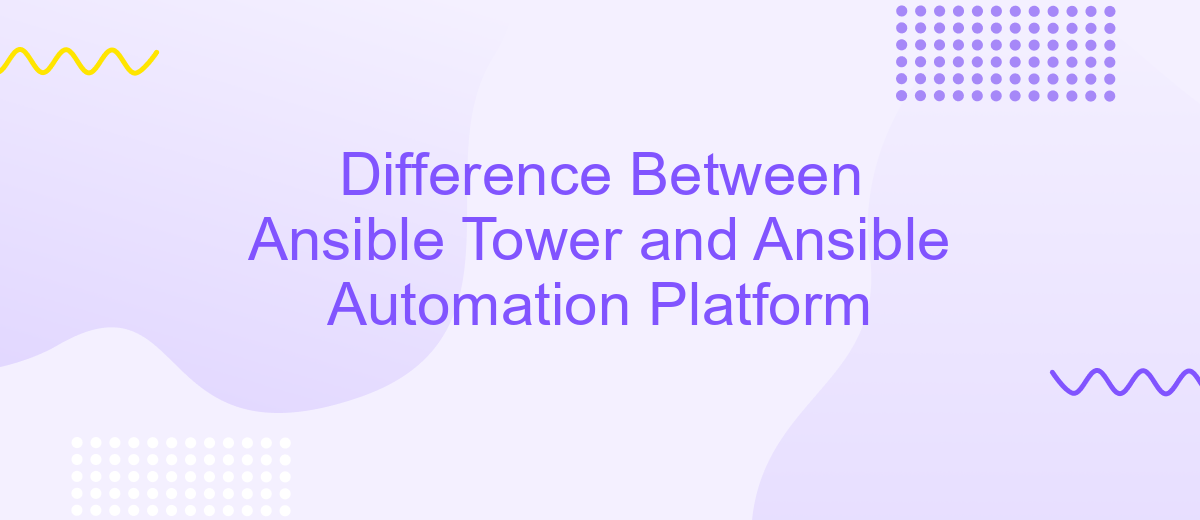Difference Between Ansible Tower and Ansible Automation Platform
Ansible Tower and Ansible Automation Platform are essential tools for IT automation, each offering unique features tailored to different needs. Ansible Tower serves as an enterprise-level framework for managing and scaling automation across teams, providing a user-friendly interface and robust access controls. In contrast, Ansible Automation Platform integrates advanced capabilities, including analytics and certified content, to streamline complex automation workflows across diverse IT environments.
Overview
Ansible Tower and Ansible Automation Platform are integral components of Red Hat's automation suite, each serving distinct purposes in IT automation. Ansible Tower acts as an enterprise-level control layer for Ansible, providing a web-based interface, REST API, and other tools to manage Ansible deployments. It is particularly useful for teams that require collaboration, scheduling, and centralized logging. On the other hand, the Ansible Automation Platform is a comprehensive solution that includes Ansible Tower, along with additional tools and services to enhance automation capabilities across entire IT ecosystems.
- Ansible Tower: Focuses on managing and scaling Ansible deployments with a user-friendly interface.
- Ansible Automation Platform: Offers a full suite of automation tools, including Ansible Tower, for end-to-end automation.
- Target Audience: Ansible Tower is ideal for teams needing centralized control, while the Automation Platform suits organizations seeking comprehensive automation strategies.
In summary, while Ansible Tower is a powerful tool for managing Ansible playbooks and tasks, the Ansible Automation Platform extends these capabilities, providing a broader range of tools to automate workflows across diverse IT environments. Understanding the differences between these solutions can help organizations choose the right toolset for their automation needs.
Key Features

Ansible Tower and Ansible Automation Platform both offer robust solutions for IT automation, yet they cater to different needs. Ansible Tower is designed to enhance the basic capabilities of Ansible by providing a centralized interface for managing and visualizing automation tasks. It features role-based access control, job scheduling, and real-time job status updates, which are essential for teams that require detailed oversight and collaboration. The intuitive dashboard and REST API support make it easier to integrate with existing systems and workflows, offering a streamlined approach to automation management.
On the other hand, Ansible Automation Platform extends beyond the capabilities of Ansible Tower by offering a comprehensive suite for all automation needs. It includes advanced analytics, content collections, and automation hub features, enabling organizations to scale their automation efforts efficiently. The platform supports seamless integration with various third-party services, such as ApiX-Drive, which simplifies the process of connecting disparate systems and automating complex workflows. This adaptability makes the Ansible Automation Platform an ideal choice for enterprises looking to optimize their IT processes across diverse environments.
Licensing and Pricing

When considering the adoption of Ansible Tower and Ansible Automation Platform, understanding their licensing and pricing structures is crucial. Ansible Tower, a component of the Ansible Automation Platform, is primarily designed for enterprise-level usage, offering a robust suite of tools for managing complex IT environments. Its licensing is subscription-based, typically requiring an annual fee that scales with the number of nodes managed. This allows organizations to budget predictably while scaling their automation efforts efficiently.
- Ansible Tower offers a tiered licensing model, often including a free trial version for small-scale evaluation.
- The pricing for Ansible Tower is influenced by the number of nodes, with discounts available for larger deployments.
- Ansible Automation Platform provides a comprehensive package, including Ansible Tower, with a broader range of features and support options, affecting its overall pricing structure.
Ultimately, the choice between Ansible Tower and the full Ansible Automation Platform depends on organizational needs. Companies with extensive automation requirements may find the broader capabilities of the Ansible Automation Platform more cost-effective in the long run, despite its higher initial investment. Evaluating the specific needs and potential growth of your IT infrastructure will guide you in selecting the most appropriate licensing option.
Advantages and Disadvantages

Ansible Tower and Ansible Automation Platform are both powerful tools for managing IT infrastructure, but they come with their own sets of advantages and disadvantages. Ansible Tower, a web-based solution, offers a user-friendly interface that simplifies the management of Ansible projects. It provides role-based access control, job scheduling, and real-time job status updates, making it ideal for teams that require collaboration and visibility.
On the other hand, Ansible Automation Platform extends the capabilities of Ansible Tower by offering a comprehensive suite for automating across different environments. It integrates with various tools and technologies, providing a more scalable and versatile solution for large enterprises.
- Advantages of Ansible Tower include ease of use, enhanced security features, and efficient team collaboration.
- Disadvantages include potential cost implications and limited scalability compared to the Automation Platform.
- Advantages of Ansible Automation Platform include greater scalability, extensive integrations, and a robust set of features for complex automation needs.
- Disadvantages may include a steeper learning curve and higher resource requirements.
Ultimately, the choice between Ansible Tower and Ansible Automation Platform depends on the specific needs of your organization. While Tower is suitable for smaller teams looking for simplicity, the Automation Platform is better for enterprises seeking extensive automation capabilities.
Use Cases
Ansible Tower is ideal for organizations that need to manage and scale their IT automation across multiple teams and environments. It provides a centralized dashboard for monitoring and controlling Ansible deployments, making it suitable for enterprises with complex infrastructures. Use cases include orchestrating application deployments, managing cloud provisioning, and ensuring compliance through automated workflows. Ansible Tower's role-based access control and audit trails enhance security, making it a preferred choice for businesses that require stringent governance and oversight.
On the other hand, the Ansible Automation Platform extends beyond Tower's capabilities, offering a comprehensive suite for end-to-end automation. It is well-suited for organizations looking to integrate various automation tools and services seamlessly. The platform supports use cases such as integrating with third-party services like ApiX-Drive, which facilitates the connection between different applications and automates data flow without coding. This integration capability is crucial for businesses aiming to streamline their operations by connecting disparate systems, thus enhancing productivity and reducing manual intervention. The Ansible Automation Platform is ideal for enterprises pursuing a holistic automation strategy across their entire IT ecosystem.
FAQ
What is the main difference between Ansible Tower and Ansible Automation Platform?
Do Ansible Tower and Ansible Automation Platform support third-party integrations?
Can Ansible Tower be used independently of Ansible Automation Platform?
Is there a difference in pricing between Ansible Tower and Ansible Automation Platform?
How do updates and support differ between Ansible Tower and Ansible Automation Platform?
Routine tasks take a lot of time from employees? Do they burn out, do not have enough working day for the main duties and important things? Do you understand that the only way out of this situation in modern realities is automation? Try Apix-Drive for free and make sure that the online connector in 5 minutes of setting up integration will remove a significant part of the routine from your life and free up time for you and your employees.

